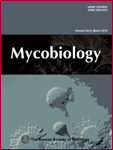
MYCOBIOLOGY
Scope & Guideline
Fostering Collaboration in the World of Mycology
Introduction
Aims and Scopes
- Fungal Taxonomy and Phylogeny:
The journal emphasizes the classification and evolutionary relationships of fungi, often through morphological and molecular analyses to describe new species and revise existing classifications. - Ecological and Environmental Studies:
Research often explores the ecological roles of fungi, including their interactions with plants, other microorganisms, and their responses to environmental changes, highlighting their importance in ecosystems. - Biotechnological Applications:
MYCOBIOLOGY publishes studies on the potential uses of fungi in agriculture, medicine, and industry, including their roles in biocontrol, bioremediation, and production of bioactive compounds. - Microbial Interactions:
The journal frequently investigates the interactions between fungi and other microbial communities, emphasizing their roles in health, disease, and ecosystem functioning. - Diversity and Conservation:
Research focuses on documenting fungal diversity, particularly in underrepresented regions, and assessing conservation status, contributing to biodiversity knowledge and conservation strategies.
Trending and Emerging
- Molecular Techniques in Fungal Research:
There is an increasing emphasis on molecular tools for identification and characterization of fungi, reflecting advancements in genomic technologies that facilitate detailed phylogenetic studies. - Impact of Climate Change on Fungal Communities:
Research addressing the effects of climate change on fungal diversity and distribution is on the rise, underscoring the relevance of fungi in ecological responses to global environmental changes. - Microbiome Studies Involving Fungi:
Emerging studies focus on the roles of fungi within microbiomes, particularly their interactions with bacteria and plants, reflecting a growing interest in holistic ecological approaches. - Bioprospecting for Novel Compounds:
There is a notable trend towards exploring fungi for biotechnological applications, particularly in the search for novel bioactive compounds for pharmaceuticals and agricultural use. - Conservation and Biodiversity Assessments:
Research aimed at assessing fungal biodiversity and conservation strategies is gaining traction, reflecting an increasing awareness of the importance of preserving fungal diversity in ecosystems.
Declining or Waning
- Traditional Medicinal Fungi:
Research on traditional uses of fungi in medicine has seen a decrease, possibly due to a shift towards more modern pharmacological studies and the search for novel compounds. - Basic Fungal Physiology Studies:
Exploratory studies focused solely on the physiological aspects of fungi without a clear application or ecological context seem to be less frequent, indicating a move towards more integrative approaches. - Fungal Pathology in Agriculture:
While still important, studies specifically targeting fungal pathogens in agricultural settings appear to be declining, perhaps overshadowed by broader ecological or microbiome-focused research.
Similar Journals

FRAGMENTA ENTOMOLOGICA
Bridging theory and practice in insect research.FRAGMENTA ENTOMOLOGICA is a prominent peer-reviewed academic journal published by UNIV DEGLI STUDI DI ROMA LA SAPIENZA, focusing on various dimensions of entomology and insect science. With an ISSN of 0429-288X and an E-ISSN of 2284-4880, this journal has embraced an Open Access model since 2006, ensuring that valuable research is widely accessible to the global scientific community. Based in Italy, at the DIPARTIMENTO DI BIOLOGIA ANIMALE E DELL'UOMO in Rome, FRAGMENTA ENTOMOLOGICA is recognized for its commitment to high-quality research, ranking in the Q3 category across multiple categories, including Ecology and Insect Science, in 2023. Its Scopus rankings further underscore its relevance, showcasing its role in advancing knowledge in the fields of Ecology, Evolution, and Insect Behavior. This journal serves as an essential resource for researchers, professionals, and students interested in the intricate world of insects and their ecological roles, fostering academic discourse that bridges theoretical and practical entomological studies.
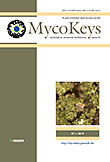
MycoKeys
Advancing fungal research for a sustainable future.MycoKeys, published by PENSOFT PUBLISHERS, is a leading open-access journal dedicated to advancing the understanding of fungal biology and its diverse implications within agricultural, ecological, and biological sciences. With its ISSN 1314-4057 and E-ISSN 1314-4049, this journal has achieved remarkable academic prestige, reflected in its 2023 Scopus rankings placing it in the first quartile (Q1) across several categories, including Agricultural and Biological Sciences (miscellaneous), Ecology, Evolution, Behavior and Systematics, and Plant Science. MycoKeys provides a platform for researchers, professionals, and students interested in the latest findings and methodologies regarding fungi, their environments, and their interactions within various ecosystems. Since its transition to open access in 2011, the journal has championed the dissemination of high-quality research to a global audience, fostering collaboration and innovation in mycology. With a publishing history that converges from 2015 to 2024, MycoKeys remains a vital resource for those committed to exploring the multifaceted roles fungi play in our world.

SYDOWIA
Pioneering Research in Ecology and Evolutionary BiologySYDOWIA is a prestigious academic journal based in Austria, published by Verlag Ferdinand Berger Sohne Gesellschaft mbH, that has been a cornerstone of scientific publishing since its establishment in 1996. With an ISSN of 0082-0598, SYDOWIA focuses on critical research in the fields of Ecology, Evolution, Behavior and Systematics as well as Plant Science, earning a notable classification in Category Quartiles with Q3 in Ecology-related disciplines and Q2 in Plant Science for 2023. The journal’s strategic insights into agricultural and biological sciences have secured a place within the Scopus rankings, where it holds the position of #191 out of 516 in Plant Science and #278 out of 721 in Ecology categories—reflecting its growing influence with a percentile standing of 63rd and 61st, respectively. Although SYDOWIA is not an Open Access journal, it continues to thrive in delivering scholarly articles that promote advancement and innovation in ecological and botanical research. Researchers, professionals, and students alike can rely on SYDOWIA as a vital resource for disseminating knowledge and fostering exploration in these essential scientific domains.

Journal of Fungi
Cultivating Knowledge in Fungal SciencesJournal of Fungi is a premier open-access journal published by MDPI, dedicated to advancing the understanding of fungal biology in its myriad forms. Since its inception in 2015, it has become a vital resource in the fields of ecology, evolution, and plant sciences, attaining notable rankings in Scopus, including Q1 status in Ecology, Evolution, Behavior and Systematics, and Plant Science, with a Q2 ranking in Microbiology (medical). The journal fosters a collaborative platform for researchers, professionals, and students by providing unrestricted access to high-quality, peer-reviewed articles, which encourages the dissemination of innovative findings and methodologies relevant to fungal research. Designed to cater to a global audience, the Journal of Fungi has established its significance in the scientific community, especially from its base in Switzerland, where it continues to contribute to the ongoing discourse in mycology and beyond. With its commitment to open access since its launch and its continuous support for groundbreaking research, the journal plays a crucial role in driving forward the scientific inquiry and ecological awareness in fungal studies.
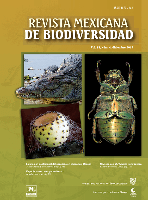
Revista Mexicana de Biodiversidad
Connecting Science and Conservation for a Thriving PlanetRevista Mexicana de Biodiversidad is a prominent academic journal dedicated to the field of biodiversity and conservation, published by the prestigious Instituto de Biología, Universidad Nacional Autónoma de México. Since its inception as an Open Access publication in 2005, it has aimed to disseminate high-quality research that advances the understanding of biological diversity in Mexico and beyond. With an ISSN of 1870-3453 and an E-ISSN of 2007-8706, the journal caters to a diverse audience, including researchers, professionals, and students, by providing vital insights into ecological studies, conservation strategies, and the sustainable management of natural resources. The journal is committed to fostering scientific collaboration and promoting the significance of biodiversity in addressing contemporary environmental challenges. By publishing innovative and impactful research, the Revista Mexicana de Biodiversidad plays an essential role in the global discourse on biodiversity conservation.
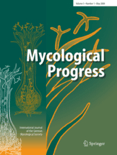
MYCOLOGICAL PROGRESS
Connecting scientists to shape the future of fungal science.MYCOLOGICAL PROGRESS, published by SPRINGER HEIDELBERG, is an esteemed journal dedicated to advancing the field of mycology and associated biological disciplines. With an ISSN of 1617-416X and an E-ISSN of 1861-8952, this journal has established itself as a leading source of high-quality research, evidenced by its impressive rankings in the Q1 quartile across various categories such as Agricultural and Biological Sciences, Ecology, and Plant Science. As of 2023, MYCOLOGICAL PROGRESS ranks 37 out of 193 in Agricultural and Biological Sciences (miscellaneous) and 183 out of 721 in Ecology, demonstrating its significant impact in the ecosystem of scientific literature. This journal not only aims to disseminate innovative research findings but also strives to foster interdisciplinary collaboration among scientists, ecologists, and agriculturists around the globe. While retaining a traditional model of publication, MYCOLOGICAL PROGRESS remains crucial for those seeking to deepen their understanding of fungal biology and its broader environmental implications.
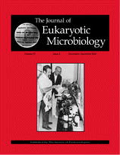
JOURNAL OF EUKARYOTIC MICROBIOLOGY
Elevating Understanding of Eukaryotic MicroorganismsJOURNAL OF EUKARYOTIC MICROBIOLOGY, published by WILEY, stands as a vital resource within the field of microbiology since its inception in 1993. With its ISSN 1066-5234 and E-ISSN 1550-7408, this journal provides a platform for the dissemination of high-quality research focused on the biology of eukaryotic microorganisms, including fungi, protozoa, and algae. The journal currently holds a Q3 ranking in the microbiology category, highlighting its significant contribution to scientific discourse in the field. With a multi-disciplinary approach, it encourages submissions that push the boundaries of understanding in areas such as microbiological ecology, phylogenetics, and molecular microbiology. While it does not offer open access, it remains widely accessible to researchers and academics through institutional subscriptions. As the journal progresses towards its converged years ending in 2024, it continues to be a beacon for students, professionals, and researchers alike who seek to explore and advance their understanding of eukaryotic microorganisms.

JOURNAL OF BASIC MICROBIOLOGY
Advancing the Frontiers of Microbial ScienceJOURNAL OF BASIC MICROBIOLOGY is a premier publication in the field of microbiology, published by WILEY since 1985. With a significant presence in Germany, this journal encompasses a wide spectrum of research topics, focusing on applied microbiology and biotechnology as well as diverse areas within medicine. Holding a commendable Q2 ranking in both its categories for 2023, it plays a crucial role in disseminating innovative findings and methodologies to the community. Researchers will find it to be an essential platform for sharing high-quality work, where it currently stands at rank #47 in the applied microbiology and biotechnology category, representing the 63rd percentile among international journals. The JOURNAL OF BASIC MICROBIOLOGY caters to a growing audience of professionals and students, offering insights essential for advancement in microbiological research and its applications. While it does not currently offer an Open Access option, it remains an influential outlet for academic excellence, continuously contributing to the development of the field through its rigorous peer-reviewed articles.
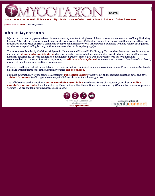
MYCOTAXON
Elevating Mycology Through Rigorous ResearchMYCOTAXON is a peer-reviewed journal dedicated to the field of mycology, focusing on the taxonomy, systematics, and ecology of fungi. Published by MYCOTAXON LTD, this journal plays a crucial role in advancing our understanding of fungal biodiversity and its significance within various ecosystems. Although it currently does not offer open access options, its contributions are vital to the scientific community, especially with its established presence since 1989. With an HIndex reflecting its relevance and attracting a dedicated readership, MYCOTAXON is recognized within the Q4 quartile in both Ecology, Evolution, Behavior, and Systematics, and Plant Science categories as of 2023. This places it among a critical cohort of journals that contribute to the understanding of ecological dynamics and plant-fungal interactions. Researchers, professionals, and students can benefit from the insights provided in MYCOTAXON, making it an indispensable resource for anyone involved in the study of fungi.

Malaysian Journal of Microbiology
Innovating Microbiology: Bridging Local Insights and Global ImpactMalaysian Journal of Microbiology is a prestigious open-access journal dedicated to advancing the field of microbiology, published by the Malaysian Society for Microbiology. Since its inception in 2005, this journal has become an essential platform for researchers and practitioners, facilitating the dissemination of innovative studies in applied microbiology, biotechnology, and infectious diseases. Based in Penang, Malaysia, this journal not only focuses on local microbiological research but also positions itself within the broader global scientific community. Although currently placed in the Q4 category in several relevant fields—including Applied Microbiology and Biotechnology, Infectious Diseases, and Medical Microbiology according to the 2023 Scopus rankings—it plays a crucial role in encouraging novel research and fostering collaboration among scientists. The journal encourages submissions that contribute to the understanding of microbial processes, disease mechanisms, and novel biotechnological applications, thereby supporting the continuous growth of knowledge in microbiology. With open access since its launch, the Malaysian Journal of Microbiology ensures that all published works are freely available to the public, enhancing their visibility and impact within the scientific community.